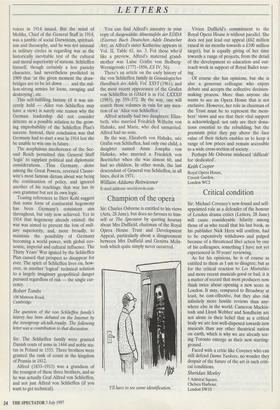Faulty logic
Sir: Alice von Schlieffen is a doughty fight- er, but her latest sortie (Letters, 28 June), asserting that the Schlieffen Plan cannot be considered a 'gambler's throw' because it was based on logic, is several bridges too far.
Does not 'the gambler mentality' com- monly adopt supposedly logical systems to try to bring risk under control? The Schlief- fen Plan shared with any three-horse accu- mulator the requirement that a succession of events should come out favourably. It was always known to be extremely risky, and increasingly so as France and Russia increased their military capacities. Schlief- fen himself wrote of the danger that 'before [the attackers] reach the Somme or the Oise they will have realised . . . that they are too weak for the whole enterprise'. His successor Moltke used a gambling metaphor when he spoke of his fear of `risking all on a single throw', and by 1914 his clinching argument for precisely such a gamble was that its chances of success were rapidly diminishing.
Alice von Schlieffen is assuming, I gath- er, that logic is synonymous with rationality, hence that the General Staff was a stronghold of empirical good sense, immune to the ideological poisons infecting the 'liberal and mercantile classes' — from which, in fact, some of the clearest rational
LETTERS
voices in 1914 issued. But the mind of Moltke, Chief of the General Staff in 1914, was a jumble of social Darwinism, spiritual- ism and theosophy, and he was not unusual in military circles in regarding war as the historically inevitable test of the cultural and moral superiority of nations. Schlieffen himself, though certainly a less panicky character, had nevertheless predicted in 1909 that 'at the given moment the draw- bridges are to be let down . . . and the mil- lion-strong armies let loose, ravaging and destroying', etc.
This self-fulfilling fantasy (if it was sin- cerely held — Alice von Schlieffen may have a view) is surely one reason why the German leadership did not consider détente as a possible solution to the grow- ing improbability of the Schlieffen Plan's success. Instead, their conclusion was that Germany had to start a war in 1914 lest she be unable to win one in future.
The acephalous incoherence of the Sec- ond Reich permitted this General Staff `logic' to supplant political and diplomatic considerations. Thus Germany, alone among the Great Powers, reversed Clause- witz's most famous dictum about war being the continuation of policy, and ignored another of his teachings: that war has its own grammar but not its own logic.
Teasing references to Herr Kohl suggest that some form of continental hegemony has been Germany's consistent aim throughout, but only now achieved. Yet in 1914 that hegemony already existed: the war was aimed to prevent the loss of mili- tary superiority, and, more broadly, to maintain the possibility of Germany becoming a world power, with global eco- nomic, imperial and cultural influence. The Thirty Years' War ignited by the Schlieffen Plan caused that prospect to disappear for ever. The spirit of Schlieffen lives on, how- ever, in another 'logical' technical solution to a largely imaginary geopolitical danger pursued regardless of risk — the single cur- rency.
Robert Tombs
108 Mawson Road, Cambridge
The question of the von Schlieffen family's history has been debated on the Internet by the newsgroup alLtalkroyalty. The following letter was a contribution to that discussion.



























































 Previous page
Previous page